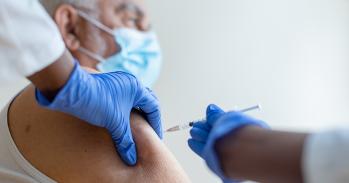
A new multidisciplinary research programme aims to develop a single vaccine that will combat four major respiratory pathogens of pigs.
A new multidisciplinary research programme aims to develop a single vaccine that will combat four major respiratory pathogens of pigs.
It’s a perfect marriage between fundamental biological research and applied clinical outcomes.
Professor Duncan Maskell
Among the most serious diseases in pigs are those that are caused by bacteria that live in their throats, airways or tonsils and can cause severe lung infections such as pneumonia. Infected animals either die quickly or fail to grow normally, resulting in substantial economic costs to the worldwide pig industry and adding to food security concerns. Because the infections are difficult to diagnose, and current vaccines have limited efficacy, antibiotics are now in widespread use in efforts to reduce infection.
A new five-year, £5.6 million grant awarded by the Biotechnology and Biological Sciences Research Council (BBSRC) under its strategic longer and larger grant (LoLa) scheme, which supports research projects requiring ‘big’ science approaches and longer timescales, aims to develop a new vaccine and a diagnostic tool to combat the four most common bacteria that cause infections in pigs.
The grant has been awarded to a consortium of researchers at the University of Cambridge, Imperial College London, the London School of Hygiene and Tropical Medicine, and the Royal Veterinary College, as well as Huazhong Agricultural University in China, and involves three UK government-funded agencies. The consortium also receives support from Pfizer Animal Health.
‘This combined expertise has generated a new opportunity that is highly synergistic and where real progress is possible,’ said Professor Maskell, Head of the Department of Veterinary Medicine and leader of the Cambridge component. ‘It’s also a perfect marriage between fundamental biological research and applied clinical outcomes.’
‘As a first step, we are isolating bacteria from pigs and assembling the largest ever sequenced collection of these types of bacteria,’ explained co-investigator Dr Dan Tucker. ‘From this, we’ll design and assemble appropriate super-vaccines and single-platform diagnostic tests. Crucially, these will immunise and test pigs for all four pathogens at the same time.’ In the final year of the project, field trials will be carried out in China, where dedicated facilities for this type of work are already set up.
Commenting on the timeliness of the BBSRC funding, Professor Maskell added: ‘Technical innovations and the availability of genome data have progressed to such an extent, and continue to do so, that only recently has it become possible to embark on this type of programme to find effective vaccines and diagnostics.’
For more information, please contact Professor Duncan Maskell (djm47@cam.ac.uk), Marks & Spencer Professor of Farm Animal Health, Food Science and Food Safety at the Department of Veterinary Medicine (www.vet.cam.ac.uk/).
Biotechnology and Biological Sciences Research Council
The Biotechnology and Biological Sciences Research Council (BBSRC) is the UK’s principal research funder across the biosciences. Its current Chair is Sir Tom Blundell, who is also Director of Research and Emeritus Professor in Cambridge’s Department of Biochemistry.
Over the past decade, BBSRC has helped achieve a step change in bioscience. Descriptive, single-problem research is increasingly being replaced by generic, predictive and systems approaches, informed by the physical, computational and social sciences. The result is that the UK has kept its world-lead in fundamental bioscience, and enhanced its capability to generate the new knowledge needed to tackle global challenges such as food security, sustainable energy and healthier ageing.
BBSRC research at Cambridge exemplifies this combination of excellence and impact. A grants and fellowships portfolio of over £50 million supports research in more than 20 departments, ranging from predictive modelling of disease epidemiology, the role of short interfering RNAs in cell regulation, data standards and software for macromolecular analysis, to mechanisms of predator vision and defensive colouration in birds. BBSRC also funds around 100 postgraduate research students including some registered with the University at the Babraham Institute.
Cambridge hosts one of six programmes that comprise the BBSRC Sustainable Bioenergy Centre, which is a £26 million investment bringing together academics and industry to investigate sustainable methods for producing biofuels. Dr Paul Dupree in the Department of Biochemistry leads the Cambridge programme, with partners at Newcastle University and Novozymes A/G, which seeks to improve the release of sugars from plant cell walls. An important resource for the Dupree lab, and many others across Cambridge, has been the protein-analysis capabilities of the Cambridge Centre for Proteomics, a long-term recipient of BBSRC funding.
Research projects requiring ‘big’ science approaches and longer timescales are supported by BBSRC under its strategic longer and larger (LoLa) grant scheme. One such grant to develop a pig super-vaccine was recently awarded to a consortium of researchers based at five universities, including Cambridge’s Department of Veterinary Medicine.
Ways to improve the manufacturability of viral vectors for therapeutics are currently being pursued with funding from the BBSRC-led Bioprocessing Research Industry Club.
BBSRC-funded research at Cambridge has also turned into notable innovations. One example is the massively parallel Solexa sequencing technology invented by Professor Shankar Balasubramanian and Professor David Klenerman in the Department of Chemistry, resulting in the spin-out company Solexa, which was purchased by Illumina for $600 million in 2007. The technology is revolutionising bioscience by improving the cost and speed of DNA sequencing by 1,000–10,000 fold on previous technologies. In recognition of this work, Professor Balasubramanian was recently named BBSRC Innovator of the Year 2010.
For more information and to download the BBSRC 2010–2015 Strategic Plan, please visit www.bbsrc.ac.uk/
This work is licensed under a Creative Commons Licence. If you use this content on your site please link back to this page.





